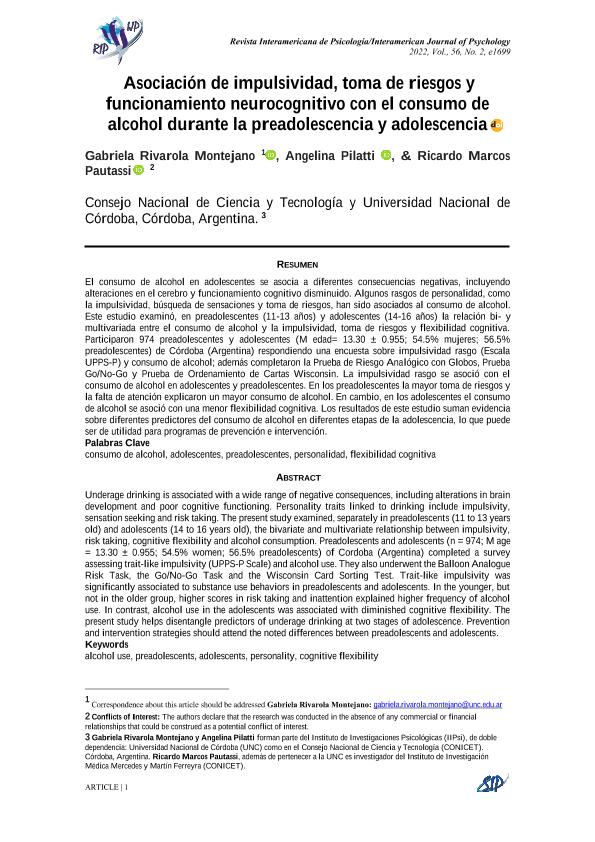Artículo
El consumo de alcohol en adolescentes se asocia a diferentes consecuencias negativas, incluyendoalteraciones en el cerebro y funcionamiento cognitivo disminuido. Algunos rasgos de personalidad, comola impulsividad, búsqueda de sensaciones y toma de riesgos, han sido asociados al consumo de alcohol.Este estudio examinó, en preadolescentes (11-13 años) y adolescentes (14-16 años), la relación bi- ymultivariada entre el consumo de alcohol y la impulsividad, toma de riesgos y flexibilidad cognitiva.Participaron 974 preadolescentes y adolescentes (M edad= 13.30 ± 0.955; 54.5% mujeres; 56.5%preadolescentes) de Córdoba (Argentina) respondiendo una encuesta sobre impulsividad rasgo (EscalaUPPS-P) y consumo de alcohol; además completaron la Prueba de Riesgo Analógico con Globos, PruebaGo/No-Go y Prueba de Ordenamiento de Cartas Wisconsin. La impulsividad rasgo se asoció con elconsumo de alcohol en adolescentes y preadolescentes. En los preadolescentes la mayor toma de riesgos yla falta de atención explicaron un mayor consumo de alcohol. En cambio, en los adolescentes, el consumode alcohol se asoció con una menor flexibilidad cognitiva. Los resultados de este estudio suman evidencias sobre diferentes predictores del consumo de alcohol en diferentes etapas de la adolescencia, lo que puede ser de utilidad para programas de prevención e intervención. Underage drinking is associated with a wide range of negative consequences, including alterations in brain development and poor cognitive functioning. Personality traits linked to drinking include impulsivity, sensation seeking and risk taking. The present study examined, separately in preadolescents (11 to 13 years old) and adolescents (14 to 16 years old), the bivariate and multivariate relationship between impulsivity, risk taking, cognitive flexibility and alcohol consumption. Preadolescents and adolescents (n = 974; M age = 13.30 ± 0.955; 54.5% women; 56.5% preadolescents) of Cordoba (Argentina) completed a survey assessing trait-like impulsivity (UPPS-P Scale) and alcohol use. They also underwent the Balloon Analogue Risk Task, the Go/No-Go Task and the Wisconsin Card Sorting Test. Trait-like impulsivity was significantly associated to substance use behaviors in preadolescents and adolescents. In the younger, but not in the older group, higher scores in risk taking and inattention explained higher frequency of alcohol use. In contrast, alcohol use in the adolescents was associated with diminished cognitive flexibility. The present study helps disentangle predictors of underage drinking at two stages of adolescence. Prevention and intervention strategies should attend the noted differences between preadolescents and adolescents.
Asociación de impulsividad, toma de riesgos y funcionamiento neurocognitivo con el consumo de alcohol durante la preadolescencia y adolescencia
Título:
Association of impulsivity, risk taking and neurocognitive functioning with alcohol use in preadolescents and adolescents
Fecha de publicación:
10/2022
Editorial:
Progress of Neuro-Psychopharmacology and Biological Psychiatry
Revista:
Revista Interamericana de Psicología
ISSN:
0034-9690
Idioma:
Español
Tipo de recurso:
Artículo publicado
Clasificación temática:
Resumen
Palabras clave:
Consumo de alcohol
,
Adolescentes
,
Pre-adolescemtes
,
Personalidaad
Archivos asociados
Licencia
Identificadores
Colecciones
Articulos(INIMEC - CONICET)
Articulos de INSTITUTO DE INV. MEDICAS MERCEDES Y MARTIN FERREYRA
Articulos de INSTITUTO DE INV. MEDICAS MERCEDES Y MARTIN FERREYRA
Citación
Rivarola Montejano, Gabriela Belen; Pilatti, Angelina; Pautassi, Ricardo Marcos; Asociación de impulsividad, toma de riesgos y funcionamiento neurocognitivo con el consumo de alcohol durante la preadolescencia y adolescencia; Progress of Neuro-Psychopharmacology and Biological Psychiatry; Revista Interamericana de Psicología; 56; 2; 10-2022; 1-25
Compartir




